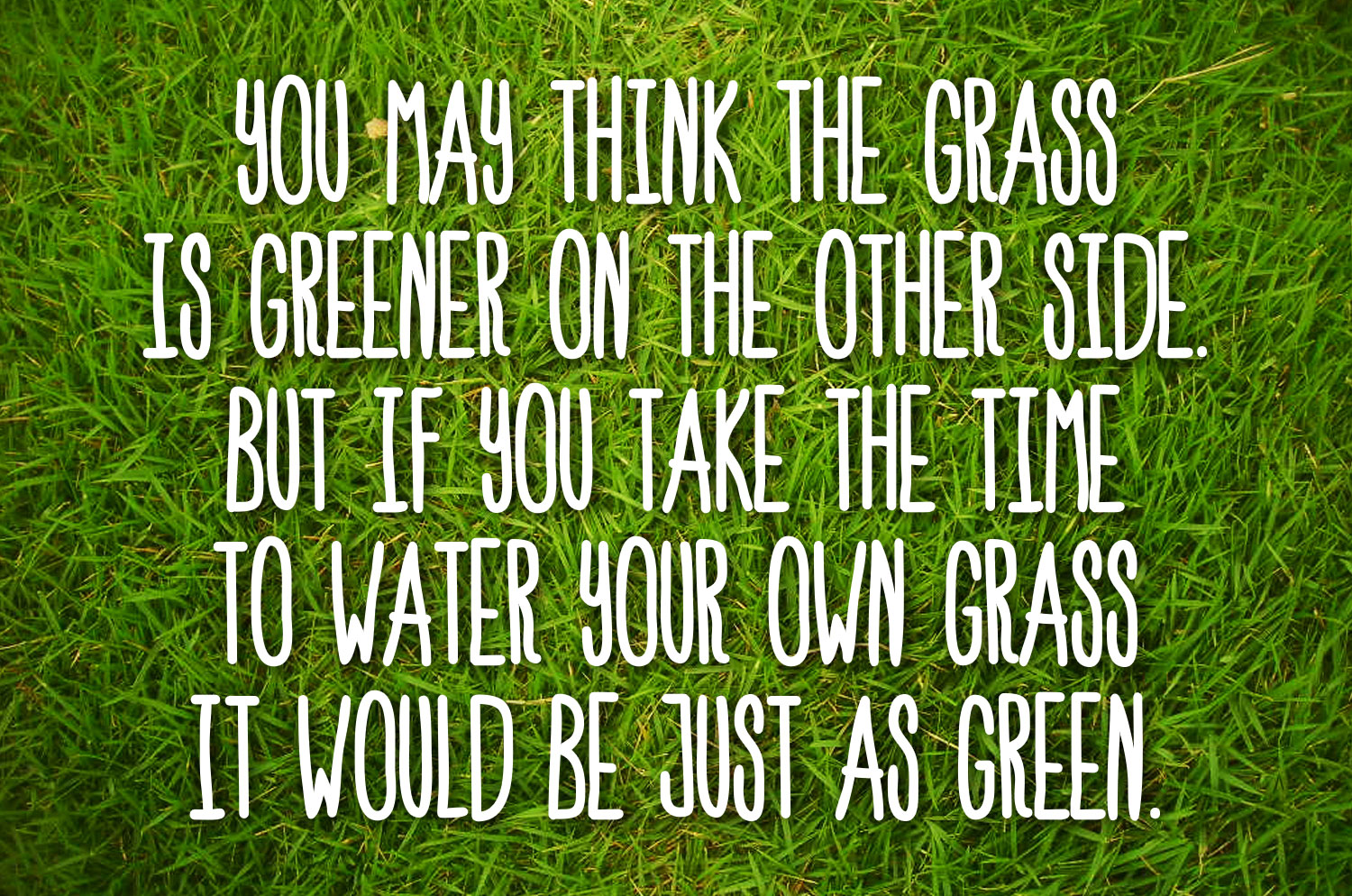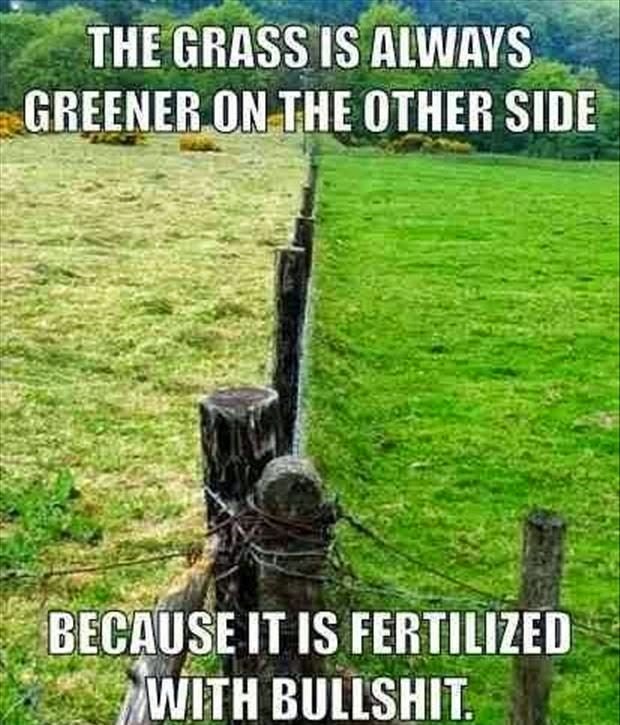Exploring The Meaning Behind Quotes Like "The Grass Is Always Greener"
Quotes like "the grass is always greener" have become a timeless expression that resonates with people across cultures and generations. This famous saying captures the universal tendency of humans to believe that others have it better than we do. It reflects our tendency to overlook the value of what we already possess and instead focus on what others have. Understanding the deeper meaning behind this phrase can offer valuable insights into human psychology and our quest for happiness.
The phrase "the grass is always greener" is not just a casual observation; it's a reflection of our inherent desire for improvement and the constant pursuit of something better. Whether in relationships, careers, or material possessions, this mindset often leads us to believe that happiness lies elsewhere. However, as we delve deeper into the meaning of this quote, we discover that true contentment often comes from appreciating what we already have.
In this article, we will explore the origins, meanings, and implications of quotes like "the grass is always greener." We will also discuss how this mindset affects our lives and how we can cultivate a more balanced perspective. By understanding the psychology behind this phrase, we can learn to appreciate the present moment and find joy in our current circumstances.
Read also:Rod Stewart The First Cut Is The Deepest Lyrics A Deep Dive Into The Soulful Masterpiece
Table of Contents:
- The Origin of the Phrase
- Understanding the Meaning
- The Psychology Behind the Phrase
- Examples of Similar Quotes
- How This Mindset Affects Our Lives
- Changing Your Perspective
- Cultivating Gratitude and Appreciation
- Famous Quotes About Contentment
- Practical Tips for Mindfulness
- Conclusion
The Origin of the Phrase
The saying "the grass is always greener" dates back centuries, though its exact origin is unclear. The phrase is believed to have been inspired by the natural world, where distant pastures often appear more lush and vibrant than those nearby. This optical illusion has been translated into a metaphor for human desires and aspirations. Over time, the phrase has been used in literature, poetry, and everyday conversations to express the idea that others seem to have better lives or circumstances than we do.
Historical References
One of the earliest recorded uses of the phrase can be traced back to the 16th century. In John Heywood's 1546 collection of proverbs, he wrote, "The grass groweth greener over the way than on this side." This early version of the saying highlights the timeless nature of the concept. Later, the phrase gained popularity in the 19th century, appearing in various forms of media and literature.
Understanding the Meaning
At its core, the phrase "the grass is always greener" suggests that we often perceive others as having better lives or circumstances than our own. This perception can lead to feelings of dissatisfaction and restlessness. While the phrase is often used in a negative context, it can also serve as a reminder to appreciate what we have and focus on the positive aspects of our lives.
Common Misinterpretations
Some people interpret this phrase as a call to abandon their current situation and pursue something new. However, the true meaning lies in recognizing the illusion of perfection in others' lives. It encourages us to examine our own circumstances more closely and appreciate the unique aspects of our own experiences.
The Psychology Behind the Phrase
The tendency to believe that the grass is greener elsewhere is deeply rooted in human psychology. It is closely linked to the concept of social comparison, where individuals evaluate their own worth based on how they stack up against others. This psychological phenomenon can lead to feelings of inadequacy and low self-esteem if not managed properly.
Read also:Two And A Half Men Season 8 A Comprehensive Guide For Fans
Factors Influencing Social Comparison
- Cultural Influences: Societies that emphasize competition and achievement can exacerbate the tendency to compare oneself to others.
- Social Media: Platforms like Instagram and Facebook often present curated versions of people's lives, making it easy to fall into the trap of comparing ourselves to idealized images.
- Personal Experiences: Past experiences and upbringing can shape how individuals perceive their own lives in relation to others.
Examples of Similar Quotes
Throughout history, numerous philosophers, writers, and thinkers have expressed similar ideas in their works. These quotes serve as a reminder of the universal nature of this human experience.
Famous Quotes About Comparison
- "Comparison is the thief of joy." – Theodore Roosevelt
- "The only person you are destined to become is the person you decide to be." – Ralph Waldo Emerson
- "Happiness lies in contentment, not in the pursuit of more." – Unknown
How This Mindset Affects Our Lives
Believing that the grass is always greener can have significant implications for our mental health and overall well-being. It can lead to chronic dissatisfaction, anxiety, and a constant pursuit of unattainable goals. Understanding how this mindset affects us is the first step toward breaking free from its grasp.
Effects on Relationships
In relationships, this mindset can manifest as envy or resentment toward a partner's perceived success or happiness. It can also lead to a lack of appreciation for the positive aspects of the relationship, ultimately eroding trust and intimacy.
Changing Your Perspective
Shifting your perspective from one of comparison to one of gratitude can have a profound impact on your life. By focusing on the positive aspects of your own circumstances, you can cultivate a greater sense of contentment and fulfillment.
Practical Steps to Change Your Mindset
- Practice mindfulness and stay present in the moment.
- Keep a gratitude journal to record the things you appreciate in your life.
- Limit exposure to social media and other sources of comparison.
Cultivating Gratitude and Appreciation
Gratitude is a powerful tool for combating the "grass is always greener" mindset. By consciously focusing on the positive aspects of your life, you can retrain your brain to appreciate what you have rather than what you lack.
Benefits of Gratitude
- Improved mental health and emotional well-being.
- Stronger relationships and deeper connections with others.
- Increased resilience and ability to cope with adversity.
Famous Quotes About Contentment
Many influential figures have emphasized the importance of contentment and gratitude in their teachings. Their words continue to inspire and guide people today.
Inspirational Quotes
- "Happiness is not something ready-made. It comes from your own actions." – Dalai Lama
- "The simplest things in life are often the truest." – Charlotte Brontë
- "Be happy with what you have while working for what you want." – Helen Keller
Practical Tips for Mindfulness
Mindfulness is a powerful practice that can help you stay grounded and appreciate the present moment. By incorporating mindfulness into your daily routine, you can reduce the tendency to compare yourself to others and focus on what truly matters.
Simple Mindfulness Exercises
- Practice deep breathing exercises to center yourself.
- Engage in activities that bring you joy and fulfillment.
- Reflect on your values and priorities regularly.
Conclusion
Quotes like "the grass is always greener" serve as a reminder of the universal human tendency to compare ourselves to others. While this mindset can lead to dissatisfaction and unhappiness, it also offers an opportunity for growth and self-reflection. By cultivating gratitude, practicing mindfulness, and focusing on the positive aspects of our lives, we can break free from the cycle of comparison and find true contentment.
We encourage you to take action by incorporating the tips and strategies discussed in this article into your daily life. Share your thoughts and experiences in the comments below, and don't forget to explore other articles on our website for more insights into personal growth and well-being.


